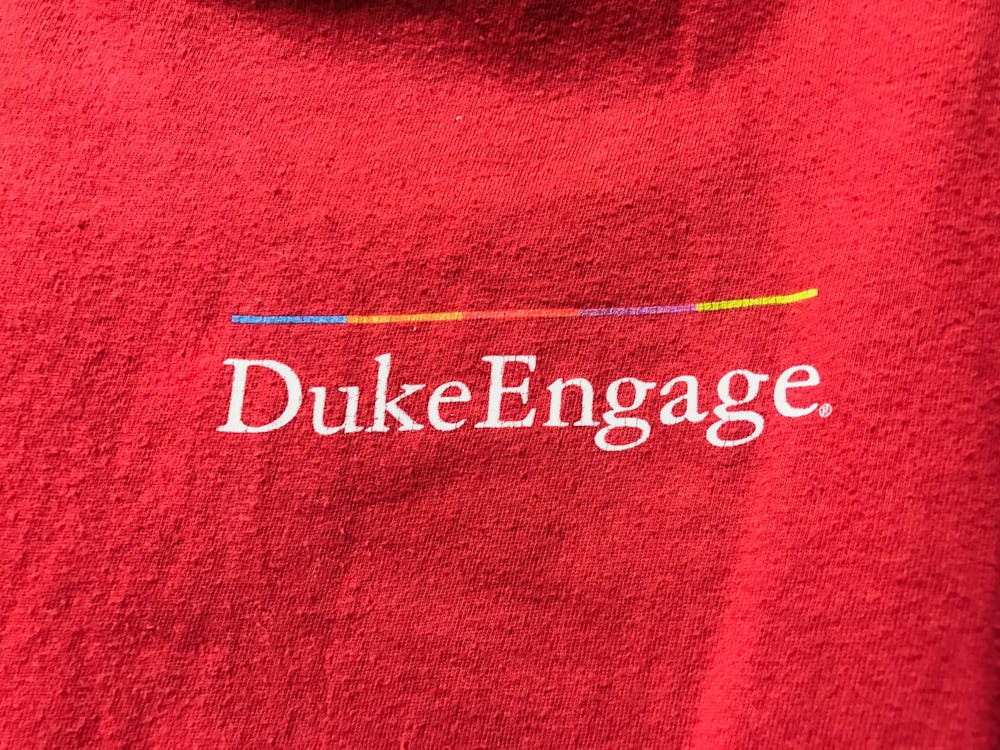The format of DukeEngage Academy was altered this year, and students are generally pleased with the decision to restructure the program.
Up until this year, DukeEngage Academy was a two-day preparation program that took place in early May. The revised Academy consists of four two-hour sessions held once a week for four weeks during the Spring semester before students embark on their summer programs.
According to a one-page flyer about the new program, the sessions are led by student preceptors, made up of DukeEngage alumni “selected from a pool of applicants based on their experience, insight, and enthusiasm.”
The revised DukeEngage pre-departure programming now also mandates that participants attend at least three events prior to their program with their program leaders and cohorts. At these meetings, students are supposed to learn more about their communities, partner organizations and one another.
Furthermore, students will attend the first-ever Fortin Foundation DukeEngage Convocation—a time for the entire DukeEngage community to come together to share stories and celebrate the summer to come—as well as the DukeEngage Reunion in August, which will be a time for reflection and discussion, according to the flier.
The Chronicle contacted several student preceptors regarding the new format; one didn’t respond, while another expressed that preceptors could not participate in interviews because communication regarding the programs needed to go through official DukeEngage channels.
In response to inquiries about why student preceptors were not allowed to speak with The Chronicle, Suzanne Shanahan, the Nannerl O. Keohane director of the Kenan Institute for Ethics, wrote in an email, “Hmmm…still confused. Would have to explore.”
DEA in its previous form had its proponents—the Duke alumni page on DEA called it the “largest civic engagement conference of its kind in the world.”
However, the program received negative reviews by some students.
“The way it’s framed, everyone kind of goes into it thinking it’s going to be a waste of time,” sophomore Christopher Chao said.
Sophomore Catherine McMillan believed that the two-day program provided insufficient preparation.
Amr Tagel-Din, a first-year who will be traveling to Amman, Jordan, through DukeEngage this summer, explained that the four sessions in the new DEA iteration are each structured around a specific theme: voluntourism the first week, then health and safety, then cultural differences and finally ethics. Students choose which time and day of the week they want to attend training sessions, and the sessions are not sorted by location or project team, he said.
Tagel-Din said that the training sessions were “mostly activity-based” and that the discussions did not consist of anything “too heavy or serious.” His preceptor was a graduate student who “did a really good job trying to engage and connect with the students.”
He appreciated that the Academy was broken up over four weeks, and said that he thought the program “was about as good as it could have been.”
When asked if he thought the four-week training was necessary, though, Tagel-Din commented that it wasn’t.
“Maybe my mind will change when I actually go, but a lot of it was just common sense, things that I can’t imagine I’ll apply too much,” Tagel-Din said.
Maria Baez—a first-year who was accepted to the Ahmedabad, India, program—had a mostly positive experience with the Academy. Baez was particularly impressed by her student preceptors.
“I love my undergrads, I couldn’t say a bad thing about them,” said Baez.
Baez also said that she was glad the Academy took place during the school year this year rather than requiring her to stay on campus for two days during the summer.
Her main complaint was that it was difficult to generalize themes across the different areas of the world that students would be traveling to.
“How can you do any one activity to prepare everyone for the places they’re going?” Baez asked.
Get The Chronicle straight to your inbox
Signup for our weekly newsletter. Cancel at any time.

Anna Zolotor is a Trinity senior and recruitment chair for The Chronicle's 118th volume. She was previously news editor for Volume 117.

